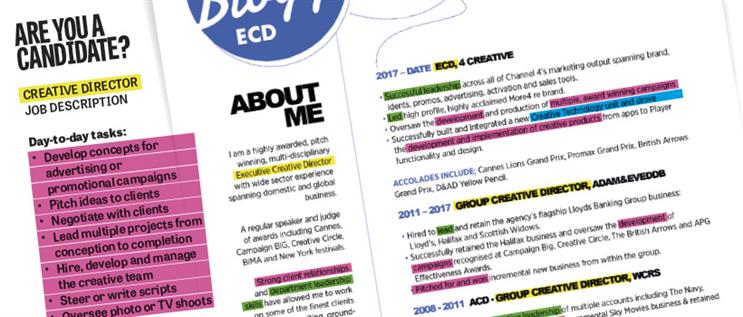Looking for work is, for most people, a job in itself. But the process of hiring can also be fraught for employers, especially at a time when agencies are under pressure to diversify their workforces.
Enter artificially intelligent platforms, which, due to their cold commitment to following and learning from data, wherever that leads, are being touted by some as an antidote to the pitfalls of unconscious bias.
Adland recruiters are increasingly looking to AI to help with the initial selection of candidates, particularly for freelance roles.
LizH, a creative industry recruitment specialist, has created a Facebook Messenger chatbot called Genie that allows agencies and job candidates to find each other within minutes by answering a series of automated questions. The tool is invitation-only and available solely to agencies looking for temporary freelancers. Its roll-out could be crucial to the industry’s future: LizH predicts that by 2030 50% of those working in the advertising industry will be doing so on a freelance basis.
Nick Grime, a partner at LizH, explains that the tool is intended to speed up the freelance hiring process, but introducing AI means it can also be used to track responses on both sides and create insights that would make the process more effective in future. This learning element can potentially rise above the prejudices hard-wired into human brains. As Grime admits, the AI machine has appointed people to roles that the recruiters would not have done themselves.
Genie, which was built by BBD Perfect Storm, was released in beta to a small pool of agencies and candidates last year and is now in the final stages of being launched as a finished product. It has been used by Saatchi & Saatchi, Droga5, ITV and Gravity Road for creative roles, such as art directors and copywriters.
Augmented processes
Another industry recruitment company, Grace Blue, has also developed an AI product. It will augment what the organisation’s researchers do when they first receive briefs from agencies for leadership roles. However, recruitment consultants will still be relied on to communicate with candidates in the subsequent stages, such as interview preparation and salary negotiation.
Hidden.IO, a service that launched last May is another example of experienced recruiters trying to use technology to create bias-free hiring processes. It works through a client and jobseeker app, each of which creates hidden profiles that aim to strip out identity bias by removing key data.
With clients such as Wunderman, VaynerMedia and MRM McCann on board, there are now plans to introduce machine-learning into the Hidden.IO system next year.
Hidden.IO’s founder Richard Bloom says the app is great for finding temporary staff because a candidate’s availability is just as crucial as their skills. But he also insists that a human interview process is still necessary for hiring permanent staff.
It’s a common refrain. While recruitment firms are wise to the power of AI, they are adamant that the human touch remains crucial to the overall recruitment process and that there are limits to machine-learning.
"There are so many kinds of emotions or bumps in the road for people that affect how they apply for a job, whether it’s interview preparations or salary negotiations. All of that would make it really difficult to provide a service for both candidates and clients without human involvement at some point," Bloom says. He adds that to move the majority of agencies away from processes that rely on CVs would require a "massive mindset shift".
Call to interview remains
LizH’s Grime strikes a similar note when he says that he does not see Genie being applicable to agencies trying to hire permanent staff. Although the initial search phase can be achieved with the help of AI, he does not believe agencies could or should be willing to dispense with the all-important job-interview stage.
However, there is one agency willing to make that big mindset shift. Ete Davies, managing director of independent digital agency AnalogFolk, has been looking at using AI at the interview stage to combat unconscious bias. The agency has already sought to strip out bias at the pre-interview stage by asking for blind CVs and test-based applications. The problem Davies is finding is that a lot of the off-the-shelf solutions open to agencies are driven by existing data, which in itself is prone to inherent bias. Amazon fell into this trap last year when its machine-learning-powered recruitment tool failed to rate candidates in a gender-neutral way because male CVs had been overrepresented in its data modelling.
Using AI to hire creatives is also "more challenging" because there is a "natural amount of subjectivity" in assessing the role compared with account handling, production and analytics, Davies adds.
Grace Blue’s co-founder Jay Haines sums up what most believe: the marriage of humans and AI will have the best future outcomes for recruitment.
He says: "[The best recruiters] have qualities that cannot be recreated by data, technology or AI.
"If, however, you are able to pair that knowledge with the benefits that AI brings to the initial identification and the subsequent utilisation of the data set that is built, you then have the ideal partnership."



